These past 19 months since moving into this house have been big. Bigger than we anticipated when we moved here - perhaps bigger than we would have knowingly taken on, so it's probably good we didn't know what we were getting ourselves into. Ha! But as the projects came up and we decided to just go for it, come what may, we of course had to bring on a lot of outside help.
Our roots are in DIY. It's how we started, when we bought our first home nearly ten years ago. And as we've learned more about what's possible in a home renovation, our ambitions have grown and we want to uncover every ounce of potential in this home. So that meant working with contractors - and if anything it made us appreciate DIY all the more.
But the bottom line is, sometimes you need a contractor. When we had to rip out the sun room in our home and pour footings for the new dining room that would be built in its place, then completely frame it and heat it and run electrical, we weren't going to do that ourselves. We needed a contractor. And the same goes with all the other large-scale renovations in our home up to this point. But now, hopefully, we've turned a corner and can handle 90% of the remaining work ourselves.
And sometimes you WANT a contractor to simplify your workload.
DIY is not always the answer. Hiring a contractor is not always the answer. But when you're renovating a home, it's important to know when you should choose one vs. the other, and what to expect with each. Here are some of the pros and cons we've experienced, both with contractors and DIY.
Pros of Hiring a Contractor
• They're more experienced, and can guide you through difficult issues that often come up in large scale renovations.
• Skilled trades, such as wallpaper, electrical, plumbing etc, specialize in their line of work and the results more often than not reflect an unmatched level of expertise.
• It can free up your time to do other things that may be more important to you.
• General contractors, hired to manage a larger-scale renovation, have connections with subcontractors and specialists in your area, saving you the task of finding them.
• They can often get better pricing on materials than a lumber yard, hardware store etc.
• They handle permitting and other details to ensure the project is up to code and legal.
• They are licensed and insured (if they aren't, don't hire them) so their work on your home is covered if it's faulty. They have to make it right.
• The sky is the limit! Well, your budget is the limit. But hiring a contractor allows you to expand your vision beyond what your skillset would allow you to accomplish.
Cons of Hiring a Contractor
• You're rarely their only job, and can be overlooked at times.
• Timelines almost always stretch beyond estimates.
• It's more expensive to work with a contractor, generally speaking.
• It's not a hands-off experience - at least not if you want it done the way you envision it in your mind. You have to be very present and checking on things constantly or things will need to be taken down and redone (or you'll be like most people and not say anything but resent it for years and years).
• You're at the mercy of their timeline and schedule - you have little say when things will get done.
• They will often default to things they've done in other homes - they are not designers, so you have to make your wishes clear.
• It brings a lot of chaos and extra people into your home, which can feel unsettled.
Above: The living room/Dining room renovation up to this point was completely done by contractors/ designed by us. See the finished living room & dining room.
Tips for Working with Contractors
• Remember that they're human. They need lunch breaks. They need weekends. They need to go home on time to be with their families. They get sick, and hurt, and tired. Your project is the biggest focus for you, but they have their own lives.
• Be assertive and speak up. Not in a demanding way, but advocate for what you want. If you don't, they will just do whatever they've done most often in other homes.
• Have a clear vision for what you want and communicate it frequently. Show them your inspiration photos, talk it through with them. Don't just say "Let's add trim around the window." Show them a picture of the trim you want!
• Make a checklist of things that need to be done, and update it often. Give copies to the subs and general contractor. Review it with them weekly at least and ask about progress, if products were ordered, what timelines are. If you're on top of it, they'll be on top of it as well.
Above: Our closet was a complete DIY
Pros of DIY
• You're in charge of the timeline. It can move a lot faster that way.
• Nobody else is going to care about the project or details as much as you will.
• You have control over your budget and can often do a project for less, if you know what you're doing.
• You aren't paying extra for labor.
• It's satisfying and rewarding and gives you a strong connection to your home.
• Becoming familiar with your home, and accustomed to working on it, saves even more money over time because you are more equipped to do common maintenance and repairs.
• You can make sure the outcome matches your vision.
Cons of DIY
• It can be exhausting and a lot to add onto an already full day.
• If it's not something you've done a lot, it can clearly look amateur.
• If you make a mistake, you're responsible.
• It can be challenging to keep the rest of your home in order when you're focused on one project.
• If you don't have tools, getting them can be an expensive initial investment.
• At 80% completion, most DIYers "take a break." And that break can last for years. Pushing through that final 20% to really finish the job is tough sometimes.
Tips for DIY
• Have a place in your home where you can escape the chaos. Bedroom, living room - somewhere you can go that is still clean, and feels complete. All chaos all the time is exhausting.
• Give yourself a deadline for completing the project, and work together a schedule to get you there. We had two weeks to tile 1500 square feet of flooring in our last house because our daughter was going to be born. That was a great motivator, and we got it done.
• Educate yourself - watch tutorials, read forums, ask professionals or others who may know. Don't just wing it - be prepared.
• Celebrate the milestones. Even if it's just a picture you send to family and friends, or a story you post to Instagram. Be excited about what you're creating.
• Try to enjoy it! Make a good playlist, invite people to help if you need, and take pride in what you're creating.
Above: Faye's room was mostly DIY, but we hired trades to hang wallpaper and frame a new window in!
No matter which avenue you go, there's no wrong way. We've done a mix of large and small scale DIY and hiring contractors since moving into this home and there are some small tasks we'll continue to hire out (wallpaper--the paper is such an investment, I want to make sure it's perfect!) or foundational tasks like plumbing or in-depth electrical. But going forward, we're excited to do most projects ourselves. In the end, we just love the freedom of getting things done on our timeline, in our budget and the satisfaction it brings is unmatched!
Anything you'd add??
Leave a Reply

WE'RE CHRIS + JULIA
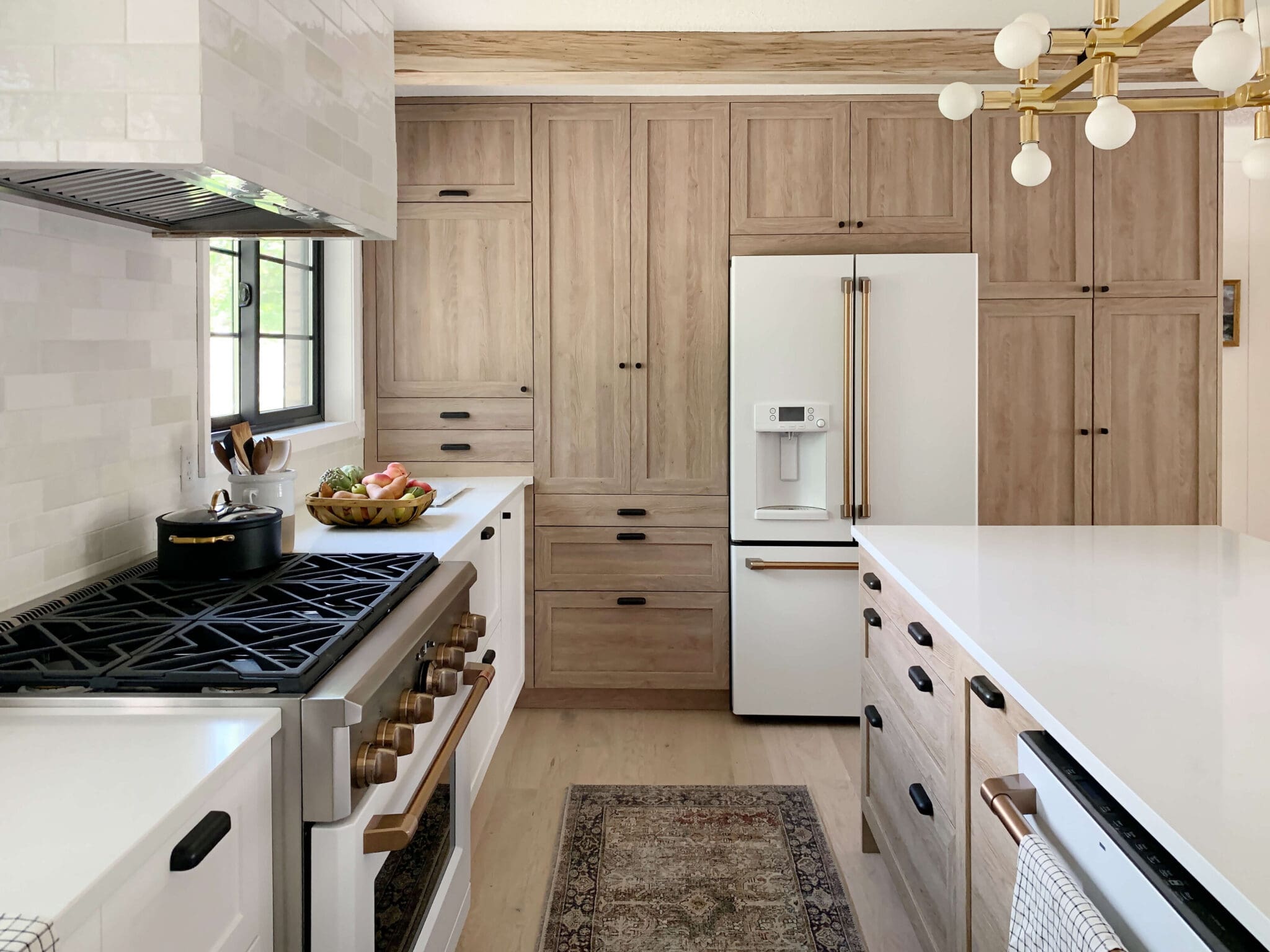
Portfolio

Projects



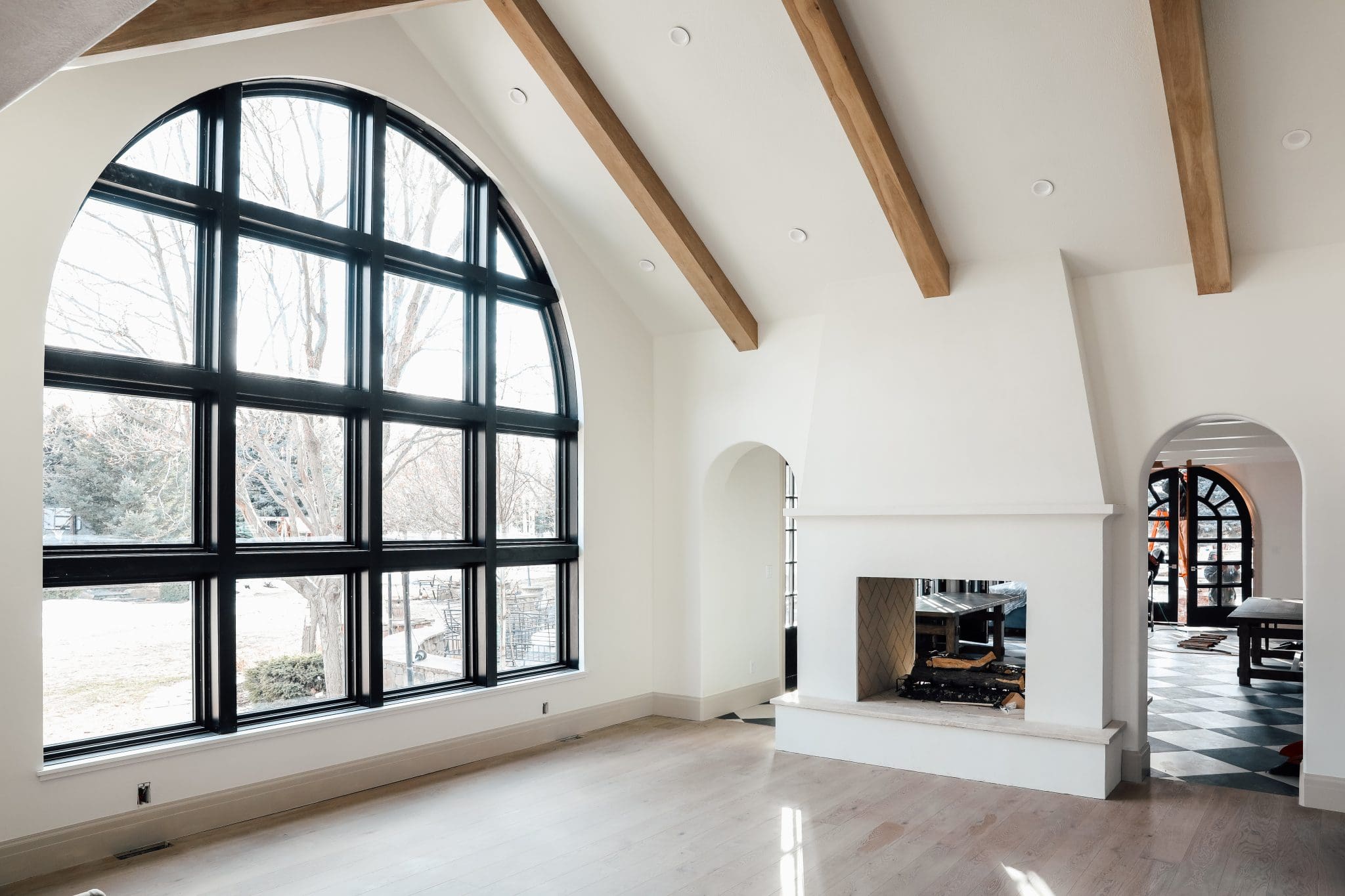

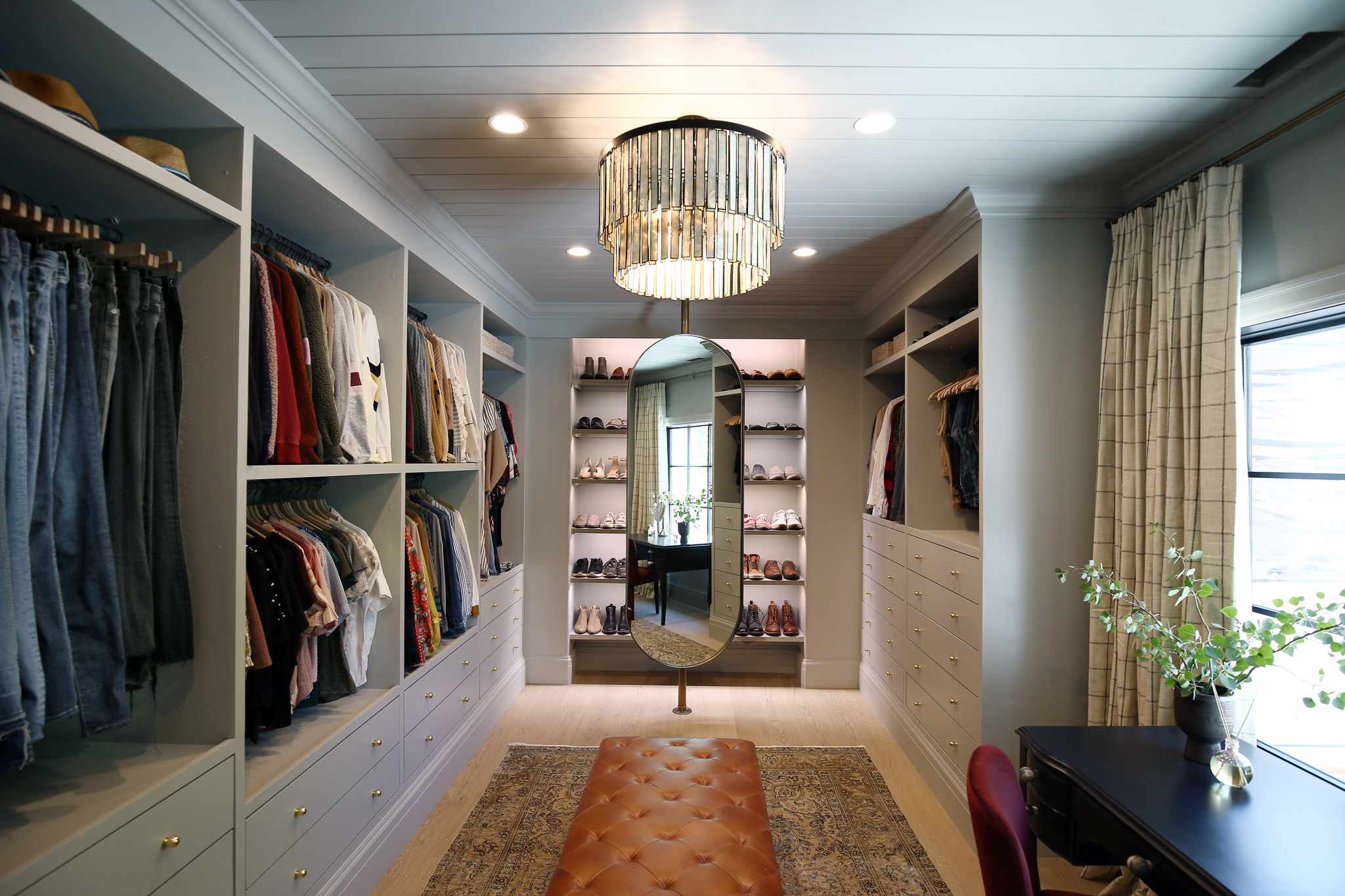











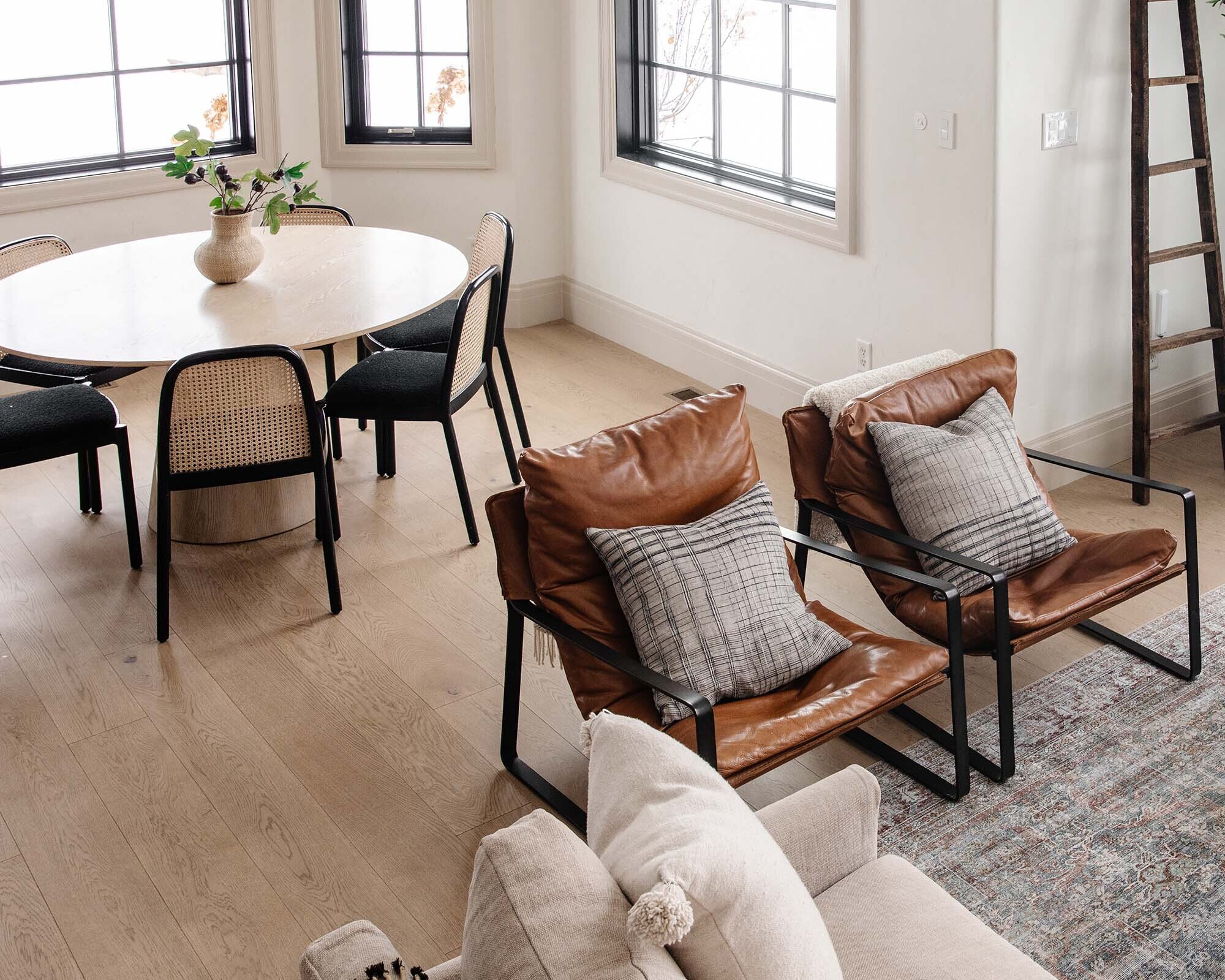




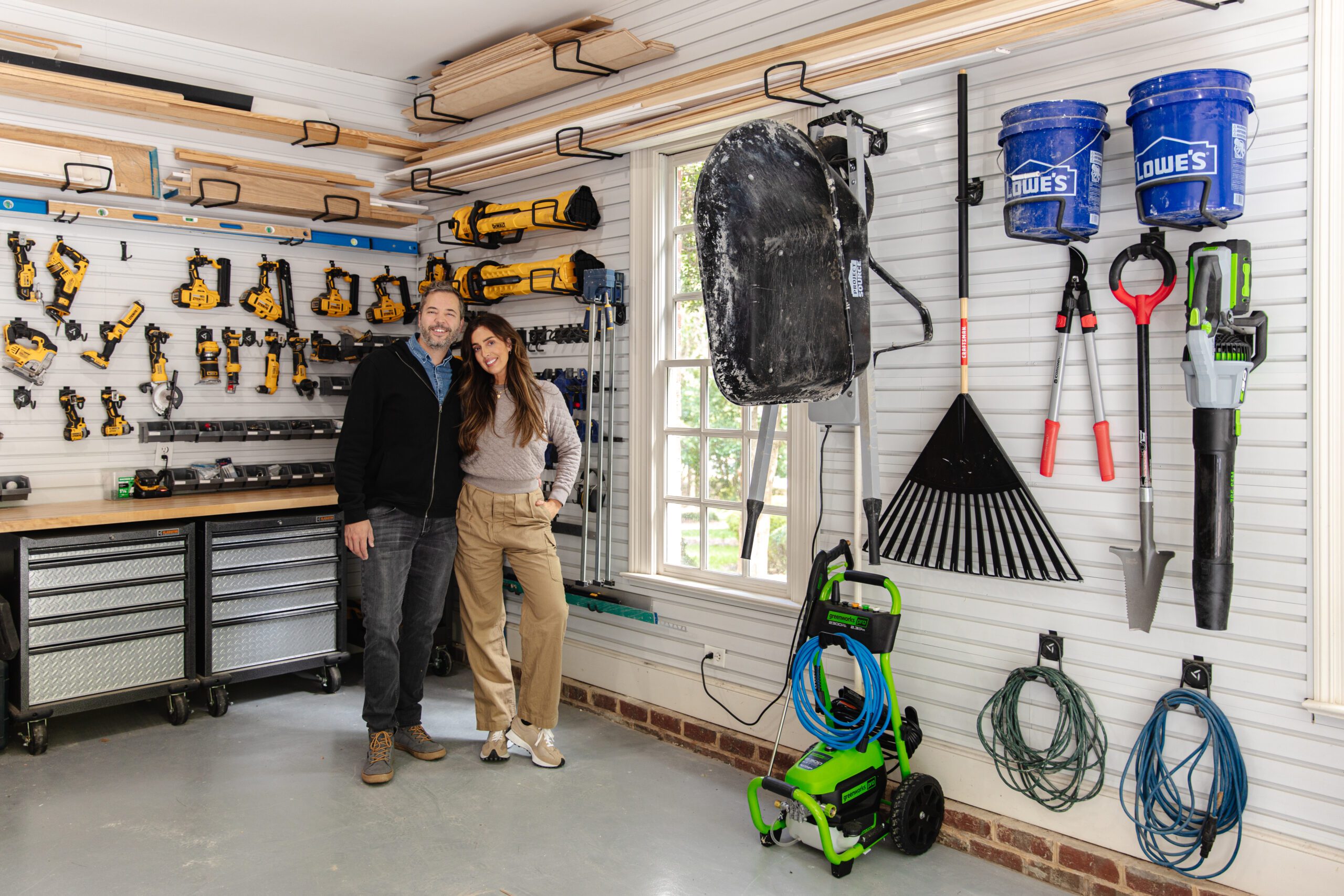
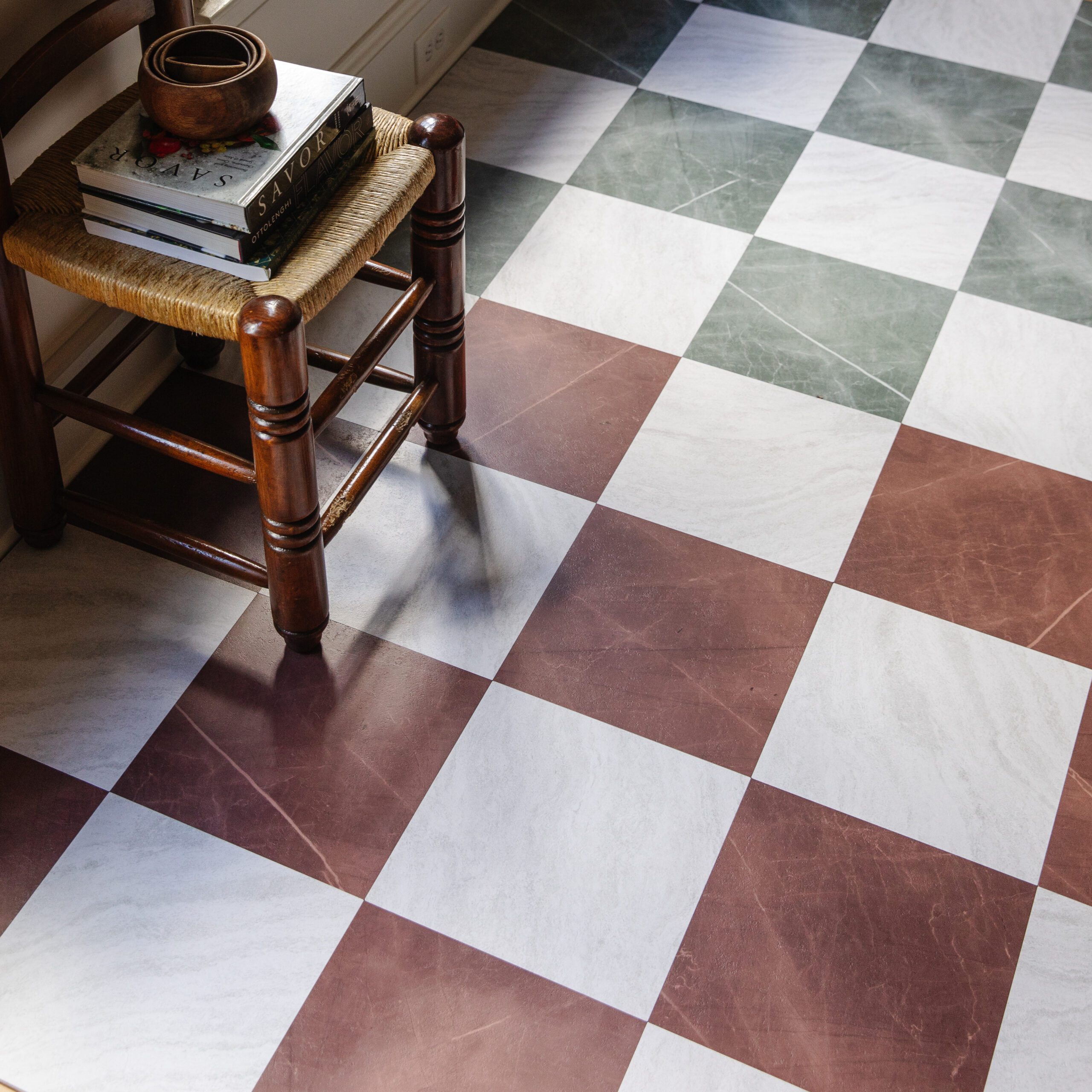
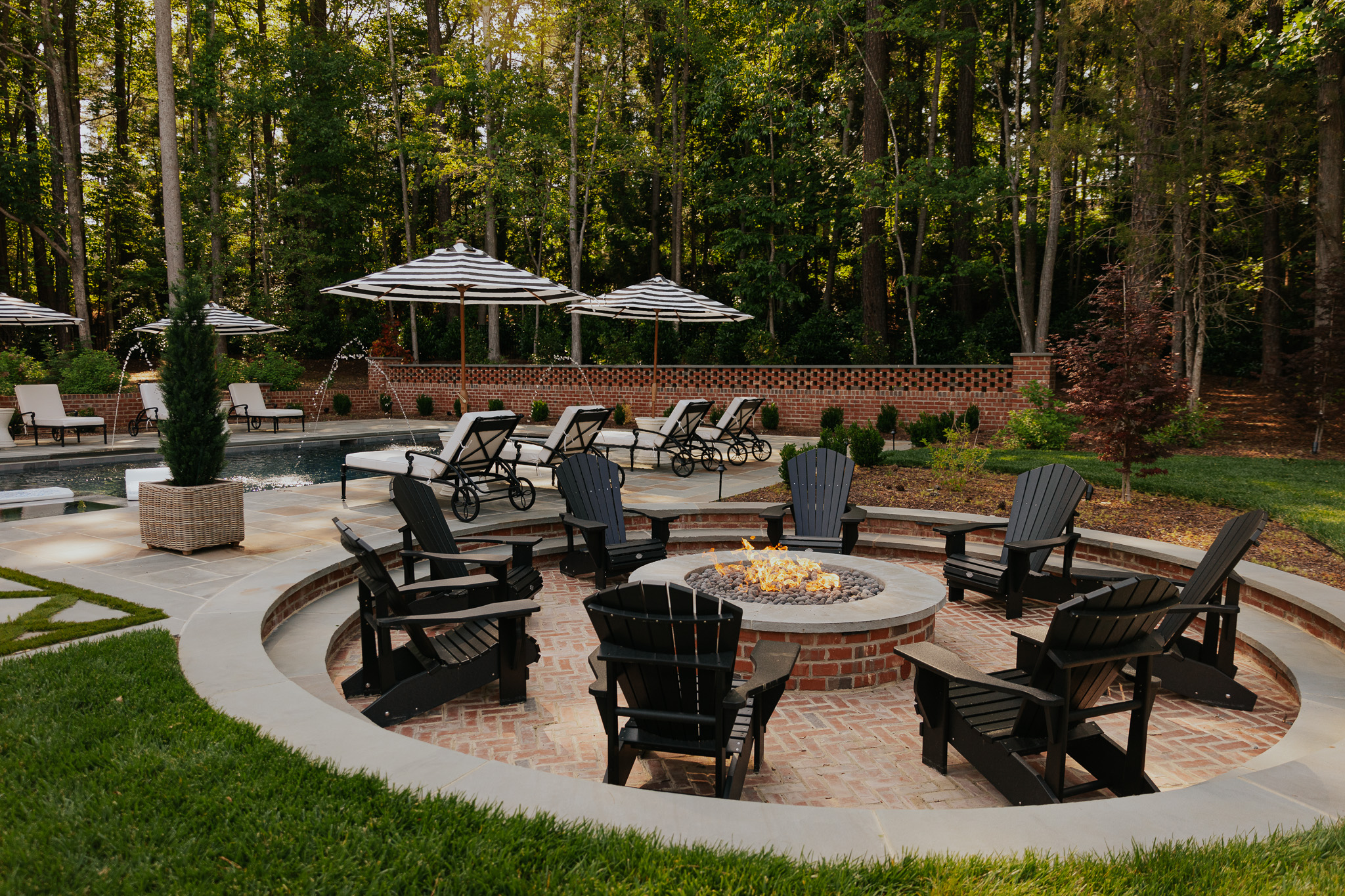

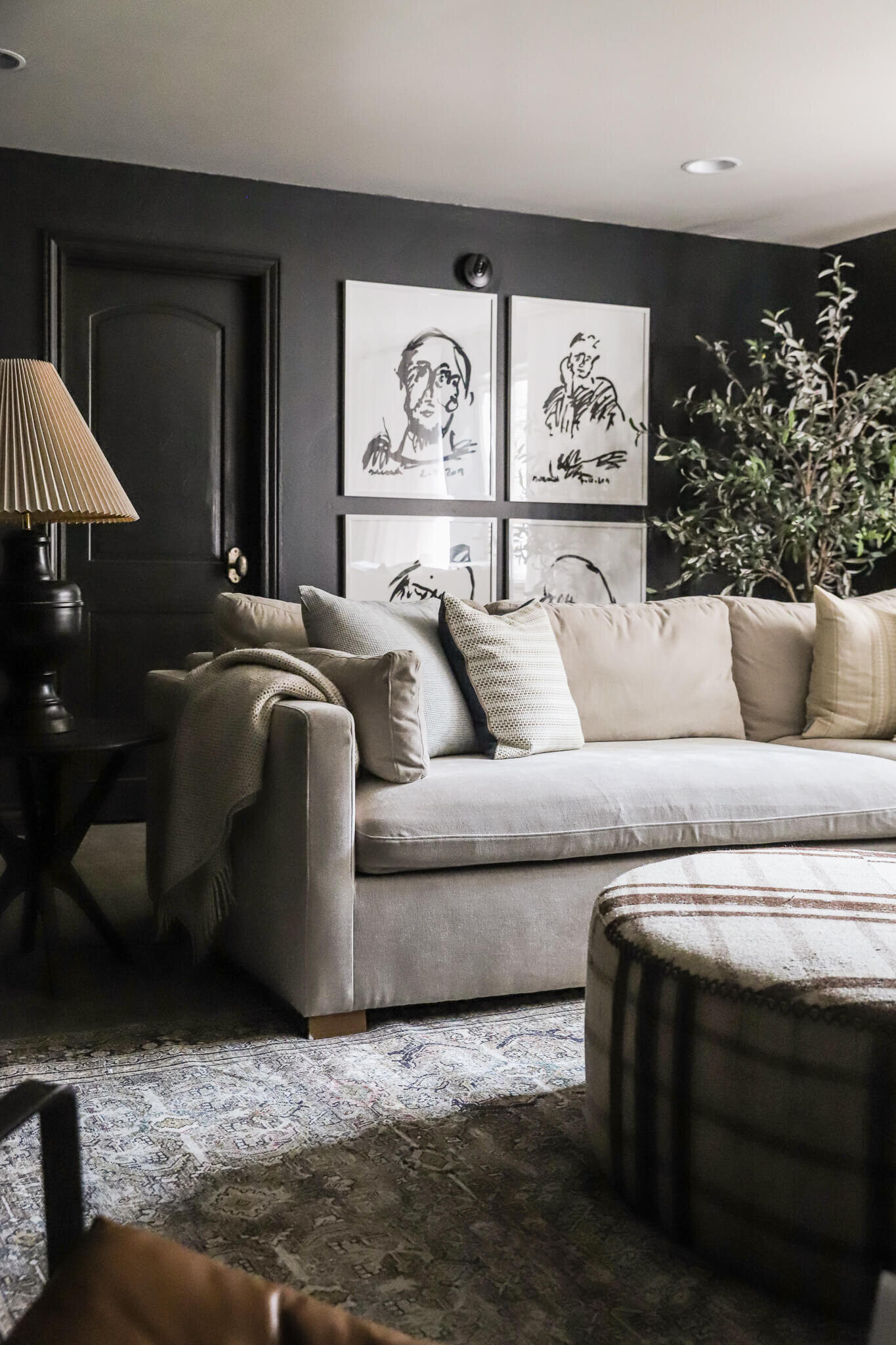










Thanks for the detailed information on the Pros and Cons of hiring a contractor, I think I will do some DIY for my room but mostly hire Contractors for more complicated ones. Thanks!
LOVE THIS!!! We're currently building a new home and although it's going well despite a global pandemic, the material and skilled labor shortages, we've had a couple of hiccups. One thing I wish I had done when we got the estimate from the contractor was to look at how realistic the "per sq/ft" and allowances were. As budget conscious as I am, I have gone over budget on a few items or have made substitutions which has been frustrating.
I also recommend to inspect the project constantly!!! My husband has caught issues/mistakes that the subs have made and the contractor didn't notice (because he was at other projects); because they were caught early on, they were easily fixed.
I can't complain, we'll have a beautiful home when it's all said and done but it's definitely been a learning experience for the next project.
Such a useful post, thank you! Especially the reminder that contractors and craftspeople are...people, with lives and challenges of their own. I am very lucky in my job that I have amazing vendors and contractors I work with, and I think part of the reason we work well together is the mutual respect. (And humor. Very important.)
How do you find good contractors, especially for smaller jobs? I know word of mouth is great, but sometimes that hasn't worked out for us. Are there questions you ask to make sure they know what they're doing, or do you rely on reviews?
Thank you for your point about contractors being human beings. In all my design reading over 20 years (online and in print) that is the FIRST time I've seen that, AND you listed it first. Kindness and humanity matter, and that consistently comes across on CLJ. Thanks also for including the pricing of custom work in your bathroom vanity story - it is so important to truly understand the value of skilled trades and the work they do. Sometimes custom is the way to go and sometimes a big box store is the answer but expecting those to be similar price points is a mistake I think lots of folks make! Keep up the great work!!
This is GOLD my friends. Thank you!
Loved this read!
Sometimes I’ve felt like we’re ‘coping out’ by hiring our contractor to do a couple of our big projects (flooring throughout and kitchen) but the reality is that those are fundamental elements of our home that we wanted to leave in the hands of experts and not put the pressure of perfection on ourselves.
I think it’s a balance and that balance looks different for everyone!
If you take the DIY route, don’t be afraid to ask for contractor pricing. A local hardware store can be a great resource often with better prices and service than chains. But even Lowe’s offer discounts if you ask. So go for it! ????
This is a great, very true and comprehensive breakdown of the pros and cons for each scenario! I know you have the experience to draw from. When we had a contractor do a chunk of the renos prior to our moving into this house I discovered I really needed to work on my people skills under stress - it was embarrassing how bad and uptight I was at communicating about issues and very quickly just had my firm yet tactful husband relay everything for me instead!
Also... I'm now inspired to make a list of the 20% last things we haven't done after 3 years. Right off the bat I know it's baseboards, awkward hood situation over the stove, and re-install windowsills. Probably a couple more if I look around.
Great post!
I go to youtube and study from those who have doe it before & experts. Learning allows me to do all the work inside and outside my home. I have learned how it tile, brick masonry, conrete sheet rock, electrical, paint, wall paper, plumbing, I have learned it takes time and patients. Plan out your projects and start purchasing for the next project while your on your current project.
We saved $60,000 on a kitchen complete redo.
As far as the time it takes, work it into your schedule. It's your house & your saving money.
Keep this in mind when your finished. Its a good feeling, thats the major reward.
I an willing to DIY as much as possible- I wallpapered my sons room by myself! And am hoping to learn how to move some electrical next week, but patching walls is something I’m always disappointed when I do myself so I’ve learned to hire that out.
I always have to remind myself that the last 20% will take up a large amount of time...but that is where something goes from okay to GREAT. Great tips!
Great post. On a personal level, I have completed DIY projects and renovations myself and also with my husband. There definitely can be significant cost savings on some projects. We have also hired individual trades to complete all or a portion of a project. On a professional level, as an interior designer, often clients DIY efforts can be costly in both time, materials and unprofessional finished product. I recommend to clients to start small. A DIY bathroom project is not always the best choice for someone without any tiling experience. Projects often take longer than anticipated and if you are completing yourself, ensure that you have time to complete; this isn't your job, so it can take a lot of weekends and evenings to complete something that a professional can complete in a few hours or a few days. In my experience schedules are significantly longer when my client completes work themselves.
One thing I would add is that regardless of if you hire a contractor or DIY, having a good professional interior designer or decorator work with you on your project can save you money and time and ensures that you have a gorgeous outcome to enjoy for years to come. I can't tell you how many clients say to me, we did this reno but we were never really loved it, or we loved the sample but once it was installed we didn't really like it.
I love that you are DIYers but know when to hire contractors. I applaud you for hiring Studio McGee for the exterior design of your house, when you needed assistance to fulfill your vision.
Another great post!
Thanks!
Hi CLJ! I work for a general contractor and also do a lot of DIY in my own home. I really appreciate the note that GC's are human too. Try to realize they 'clock out" at night and on the weekends, and unless it's really critical/an emergency respect that. I also think these two "cons" are so so important for folks to understand, and they have only become MORE complex with Covid.
• Timelines almost always stretch beyond estimates. (We're an optomistic bunch lol. I'd say take the time line and times by 1.5 maybe even 2x in Covid world.)
• You’re at the mercy of their timeline and schedule – you have little say when things will get done. (Often the GC is at the mercy of their own subs! Just because I want the plumber to come Monday, doesn't mean he is avaliable.)
Additionally I will add, if your GC gives you a deadline - MEET IT!! If you're told we need a door decision by February 1st generally that's not an arbitrary date. It's planned out for the needed time to order the door, manufactoring, shipping etc. So if you the homeowner miss your deadlines - you could directly affect your project schedule!
Read the scope description in your contract. If you assume XYZ is included, make sure it is clearly written into the agreement. The majority of our client issues come from misunderstandings or interpritations about the scope of our work. Ask for clarifications on allowances as well.
And my last tip - you win more flies with honey. A nicer client, who is respectful, through, clear and concise without being demeaning will always, always get a faster reply and a few extras throw in as a opposed to a demanding or rude client. (Although I do strongly believe in standing up for yourself! Just be nice while doing it.)
If you don't finish a project in a timely manner, you start to "not see" the deficiency. It fades into the background and you literally do not see it. Your guests see it, though, and wonder what's going on. So you should force yourself to finish projects.
Thank you for bullet point #1 - Tips for Working with a Contractor. My husband is a contractor. He loves his job and takes great pride in his work. He wants people to love the outcome. But his clients often call/text/email on nights or ask for work on weekends. He is already doing a ton of work behind the scenes to coordinate subs and order materials, so I appreciate you reminding your audience that contractors need their nights and weekends off, and that they have families and lives too!
I know you’ve mentioned difficulties in just simply getting ahold of your contractor. Any tips on how to handle those situations and/or avoid them to begin with?
I really love this post! As a wife of a licensed plumber who owns his own business, I really appreciated the part where you remind people that tradesmen have families and lives beyond the job. 9 times out of 10 these men come home late because they need to meet a deadline or are exhausted when they get home or they skip lunch to get ahead. I also really loved how you also wrote about being clear about your wants and needs! I'm over here raising my hand with multiple projects in my home that have 20% left to go. ( many of them plumbing related *audible gasp*)
The DIY con of pushing through that final 20% is SO real. We have been renovating our home for the last year through various DIY projects and just recently sat down and wrote a list of the “Final 2%” projects that have started to pile up. Every few weeks, we take a day (or few hours) to finish those little odds and ends that we were ignoring because it was “mostly done”. It has held us accountable and allowed us to feel truly proud of seeing a job through to the very end.
How do you recommend finding good contractors in the first place? And how many quotes do you typically get?
This is a great question and can often be the hardest and longest part of even getting a project started. I've had the most success with visiting HomeAdvisor.com and pursuing contractors based on the work I need done (but be sure you're ready, they will call you!). Another great place to start online is to go through Houzz.com. Lots of reputable contractors will proudly post and boast about their work on there and you can even link up with contractors who have worked on a house or project with a similar vision to yours. You could also call your local lumber yard and ask about contractors who fit the description of your project. Some of those business relationships go back years and years and they could give you good advice on who to call (and who pays their bills). Typically getting three quotes, if you can, should give you and idea of what the cost will be, but don't base your decision on that alone and don't ever accept a low low number - they are missing something and it'll just cost you more later. I've had contractors come by and leave quotes in my mailbox for exterior work without even knocking on the door to talk to me. That's a no-hire. Communication is key and it's important you hire someone who you feel will listen and work with you no matter the size job.